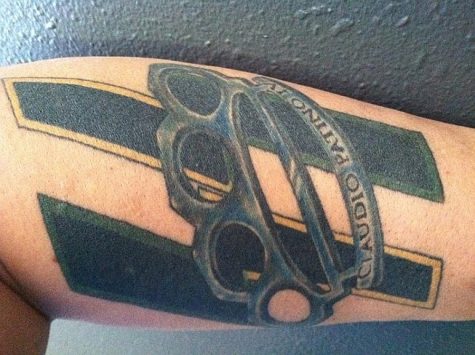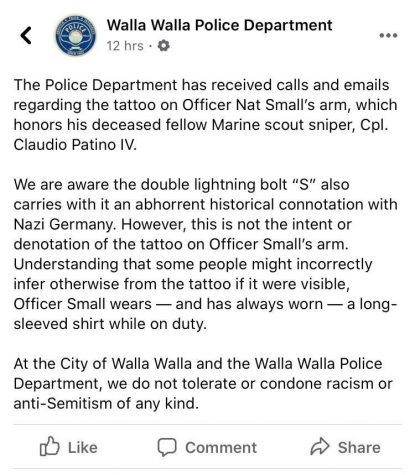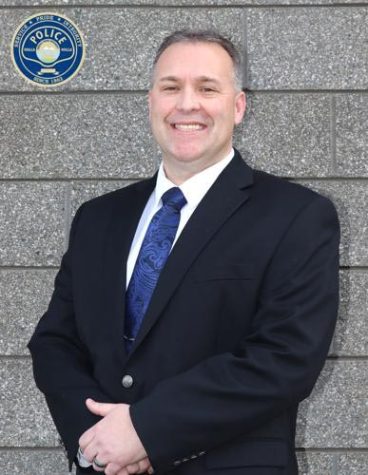Police Officer Nat Small’s tattoo continues to stir controversy
September 17, 2020
In early June, a photo of an arm tattoo stirred one of Walla Walla’s biggest controversies of the year. The tattoo, belonging to Walla Walla Police Officer Nat Small, depicted a brass knuckle with the name of a fallen soldier and a “SS” lightning bolt. The “SS” Schutzstaffel has a history of Nazi anti-Semitism and white supremacy. Officer Small, a Marine Corps veteran, said the “SS” stands for “Scout Sniper,” and the tattoo is a tribute to his fallen comrade and friend in the unit.
In an article published by The Guardian in 2012, Lieutenant Colonel Stewart Upton said “Use of the SS symbol is not acceptable.”

President of Whitman College Kathy Murray responded to the controversy with a schoolwide email on June 28. She emphasized her concerns with Officer Small bearing this tattoo openly in public and the lack of response from the Walla Walla Police Department (WWPD). Murray announced that Whitman would no longer hire off-duty Walla Walla Police for events and will no longer grant them access to Whitman training facilities.
“The remedy here is unambiguous. Officer Small must be compelled to change or remove his tattoo,” Murray wrote.
President Murray’s response did not satisfy all members of the Whitman community. Phyllis Pawa, a senior religious studies major and co-president of Kehillat-Shalom, took issue with the direction of Murray’s response.
“I knew that there was going to be a lot of backlash from Walla Walla for writing an email basically shaming the town when she hasn’t called out her own community,” Pawa said. “I think it’s good to disaffiliate from the police; I don’t think it’s the solution.”
Pawa addressed these concerns in a personal email response to President Murray. She introduced herself as an active student and community member and expressed that the Whitman community and Walla Walla should be seen as one and the same.
“I am grateful as a student for your actions to disaffiliate from the police,” Pawa wrote. “I feel safer on our campus, but I don’t feel safe in Walla Walla and these communities cannot and should not be made to seem separate.”
On July 8, the Walla Walla Union-Bulletin released a statement from Officer Small on the tattoo controversy. Small described the personal significance behind the tattoo he got in 2010 but announced he would modify it to remove the “SS” portion.
“My personal intent was nothing more than to honor my fallen teammate, with what was a common symbol within the Scout Sniper community at the time,” Small said.

Small said he made this decision on his own without influence from the WWPD or the City of Walla Walla. In August, Walla Walla Police Chief Scott Bieber said the “SS” had been removed. No images were made public.
Pawa said she felt Officer Small’s public action was motivated by a lack of accountability rather than evolution on the issue.
“When Nat Small agreed to have his tattoo removed, the way I read his public letter was that he wasn’t getting it removed because it was problematic,” Pawa said, “but he was getting it removed because he didn’t like that he was upsetting and tearing apart the community.”
Cormac Li, an undeclared sophomore and co-president of Kehillat Shalom, shared his disappointment with the progression of the scandal.
“This shows us the very little knowledge of the community, including the Officer and a lot of people, of what anti-Semitism means,” Li said. “Why do these symbols hurt people?”
During a town hall in mid-August, Chief Bieber lauded Small’s announcement as a demonstration of his good character. The same town hall addressed tattoo policies in the WWPD. No new regulations were put in place and City Attorney Tim Donaldson said that such regulations would conflict with the right to free speech.
When asked if Small’s decision to remove the tattoo changed the College’s relationship with the Police Department going forward, President Murray said she is waiting to decide.
“I was pleased to learn that Officer Small acknowledged the damage caused to our community by his tattoo and decided to have it altered,” Murray wrote in an email to The Wire. “I am waiting for the City Council to complete its recommendations related to the WWPD before considering any changes to what I said in my earlier memo to the campus community.”
Li shared his feelings about Murray’s response and called for an increase in education on Judaism and civil rights.
“I have never expected this could be solved in a short era of time, either this individual incident or the entire atmosphere in this country over these sorts of situations because it requires education,” Li said. “It is going to be a long process.”






Christopher A White • Jan 31, 2021 at 12:55 am
Coming from a Proud Texas Navy Family im utterly Disgusted!
4 Generations of Navy Men in my Family fought the oppressive, destructive Tyranny of Race Superiority; specifically: ‘ The Nazis’.
I’m saddened with the act, and the way WWPD has delt with this Situation. Not only did they rally in his defense, they promoted Nat Smalls to head the community outreach program; Distasteful!
My Dad: David Alan White : United States Marine; Class of ’79 would be Livid. My Papa: Charles Llyod Anderson: United States Navy; WWII would give a Nazi or sympathizer therein a Run for his Gun; I assure you He wouldn’t make it too far.
I’m an American.
Americans Defeated Hitler, and The Nazi Regime.
As an American I Detest Nazism Fully, Whole- Hearted, and Dutifully as my American Family Did, and Continues to Do.
The Big Question. Still remains: Why double ‘ S’ ( lighting boltz) and NOT Regular S’s?
I’ m a strong believer God can Change Hearts over time. My Fervent prayer is Nat Smalls realizes the True Value of The Country that fed, trained, and supported him on his journey to becoming a Scout Sniper in The United States Marine Core, and Truly Defeats the Anger, Sadness, and Confusion that Allowed him to get (Double ‘ S’ lighting Boltz) as a permanent mark on his body.
The Community is Aware.
Thank you Whitman College for your Care, and Concern. The Community Supports you.
Marianne Allessio • Sep 19, 2020 at 2:55 pm
I truly do not believe that we should value the opinion of a STUDENT at Whitman College These are transient children, it should NOT matter their opinion. Let’s talk to the community that actually lives n Walla Walla.
I’m fairly certain that Whitman might find it difficult to hire an off duty officer for any of their needs. Ms Murray values her opinion much more than the citizens off Walla Walla do. I personally find it disgusting that anyone could be shortsighted enough to demand Officer Small remover a tattoo on his OWN BODY honoring a fallen soldier from his division. A tattoo that was NEVER displayed while on duty. Find something in your own life to worry about because I know you do not mingle in with the community of Walla Walla!!
Sandra Hatch • Sep 18, 2020 at 10:14 am
I believe in free speech, his tattoo did not hurt any ones feelings except for those that have issues with themselves! If you don’t like it don’t look at it! It does not make the person. He explained why he has that tattoo. My son was a snipe in the army, he lost friends, he lost body parts, He has his own rights, sorry If someone THINKS what Mr. Smalls tattoo means, maybe they should have asked him, not judged him. And for him taking care of it himself. What a huge gesture!
People, take a breath, because you have a tattoo, I don’t like, because your black, brown, pink, purple,
It does not matter, GET OVER IT, Stop pushing the point move on, Stop reminding everyone your Black,
Stop with the Black lives matter! We all matter, it does not matter what color you are, it does not matter that you have an SS on your tattoo, if your a good person that is ALL that matters!
LOVE THY NEIGHBOR!
Jonathan Goin • Mar 22, 2022 at 1:00 am
Sandra and Marianne… the both of you are absolutely correct with your statements!!! I firmly believe that everyone should mind his or her own business. This tattoo is symbolic of something near and dear to his heart. Maybe he wasn’t aware of the “double lightning bolts” as being “Pro-Nazi”. Maybe the tattoo artist was playing a mean joke. I mean, who knows??? To me, the ONE and ONLY thing that should matter is this officer’s actions and reactions, with the public that he serves on a daily basis. Ask around and see how he generally treats those that he comes in contact with on a daily basis and those that he has had run-ins with while on duty. And then, if you find that he is an exemplary officer, in that aspect, and has no write ups for ill conduct while on duty and/or he isn’t leading the weekly “KKK” parade down Main Street on Sunday mornings, then it really isn’t any of whoever’s business but his, especially seeings how it was stated that he has ALWAYS worn a long sleeve shirt while on duty!!! Now, in response to Christopher A. White’s comment, absolutely first and foremost, I would just like to take a moment to genuinely, sincerely and wholeheartedly thank you, your dad and your papa, for your service, as well as theirs, to this great country of ours!!! It is ONLY because of selfless people such as yourself, and all the other service men and women throughout time, that has afforded people like me the freedom to do as I/we please and go about life as we want, however we want. Just, so be, that it is on the right side of the law. However, that is where my support for you and your comment ENDS!!! PLEASE, allow me to elaborate on my last statement and fill you in as to why you and I NO LONGER see eye to eye. So, you paying attention??? YOU, as a proud and outspoken military veteran of the United States Armed Forces, surely must have heard of a man by the name of “Franklin D. Roosevelt”!?!?!? Assuming that you MUST know who he is, I just can’t help but to believe that you know about and are well aware of this little thing called the “FOUR FREEDOMS”!?!?!? Correct so far??? I thought so. Now, do you know what the NUMBER 1 (you know, THE VERY FIRST ONE) freedom on that list of the “FOUR FREEDOMS” pertains to??? Let me tell you… FREEDOM OF SPEECH!!! SO, as a service member of the United States Armed Forces, DID YOU, OR DID YOU NOT, fight for EVERY SINGLE AMERICAN CITIZEN to be able to live a life of FREEDOM??? I think you DID!!! AGAIN… am I correct??? Right, again… I thought so.
Now, guess what!!! I’ve got some terrible news for you!!!
You sir, ARE A RED BLOODED HYPOCRITE!!!
You fought for EVERYBODY to have and enjoy the FREEDOMS that come with being a U.S. citizen and that ONLY means ONE THING… It simply means that YOU fought for the (and from Roosevelt’s 1941 “STATE OF THE UNION SPEECH” I quote)
1.) Freedom of SPEECH
2.) Freedom of worship
3.) Freedom from want
and then,
last but, most certainly, NOT the least,
4.) Freedom from fear.”
FOR EVERYBODY!!! Yet you still take it upon yourself to come on here and be heard by many!!! All because, in that feeble little mind of yours, YOU, yourself, are an upstanding member of the community, as well as society, and just because of that alone, YOU can now easily spot and point out those who are NOT deemed worthy, such as Officer Nat Small. You know, the age old… “I’M SO RIGHTEOUS, that I shall judge you ALL, but yhe best better NOT dare judge ME” for I am the highest of the high in society and ONLY god can judge… oh and me too, Mr. White!?!?! You then go on to tell the world just how “utterly disgusted” you are with his tattoo and his decision to get that particular tattoo. You go on to tell people how they should think and live their own lives. All the while you fought for these same exact people to have and enjoy the freedoms of every day life. I bet that “if” it were up to you, Mr. White, this officer of the law would have already been completely and totally shunned, drug by his feet through the streets of Walla Walla, banned from moonlighting anywhere within a 1000 mile radius and be fired from the force. In turn, over a simple tattoo that “hurt your feelings” this man should NOT be allowed to patrol the streets. And all of this simply because he has a certain “tattoo” that you deemed hateful and whatever else you said about it, even though he has ALWAYS worn a long sleeve shirt and has NEVER once allowed the tattoo to be visible during the time that he serves the public!!! And let’s no forget that you fought for this man to have the freedom of speech but you’re utterly disgusted by him simply because your feelings got hurt!!! What a shame. Shame on you… shame on you Mr. White!!! I hope that all the other military men and women do NOT think along the same lines as you!!! Especially towards ONE OF THEIR OWN fellow service members… NOT TO MENTION A FELLOW HUMAN BEING!!!